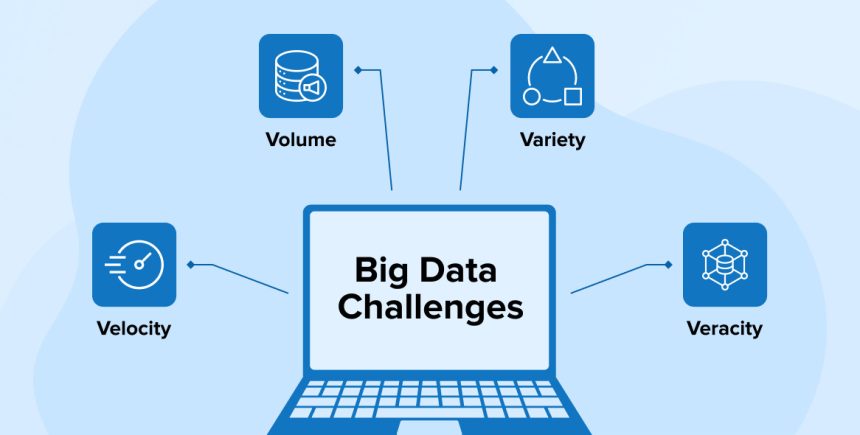In the digital age, data reigns supreme! With the exponential growth of information generation, organizations are faced with the daunting task of managing big data effectively. However, amidst the vast sea of data lie challenges that can seem insurmountable. From scalability issues to integration complexities and quality assurance dilemmas, the journey towards harnessing the power of big data is fraught with obstacles. Yet, within these challenges also lie golden opportunities for innovation and growth.
So, how can businesses navigate this intricate terrain of data management to unlock its full potential? Join us as we delve into the realm of “Challenges and Opportunities in Managing Big Data: Scalability, Integration, and Quality Assurance,” unraveling the complexities and unveiling strategies for success!
Scaling the Heights: Tackling Scalability Challenges
In the ever-expanding universe of data, scalability reigns supreme! The ability to scale resources seamlessly in response to growing data volumes is crucial for organizations aiming to stay ahead of the curve. However, achieving scalability comes with its own set of challenges:
1. Infrastructure Constraints
- How can organizations ensure that their infrastructure can handle the influx of data without buckling under pressure?
- Are traditional systems equipped to scale effectively in today’s data-driven landscape?
2. Cost Considerations
- What are the financial implications of scaling infrastructure to meet growing data demands?
- How can businesses balance scalability needs with budget constraints?
3. Performance Optimization
- How can organizations maintain optimal performance while scaling their data infrastructure?
- What strategies can be employed to mitigate performance bottlenecks during periods of peak data influx?
Integrating the Puzzle Pieces: Overcoming Integration Complexities
Integration lies at the heart of effective data management, facilitating seamless communication and collaboration across disparate systems and sources. Yet, integrating diverse data sets presents its own set of challenges:
1. Data Silos
- How can organizations break down silos and integrate data from disparate sources?
- What tools and technologies can streamline the integration process and promote data interoperability?
2. Compatibility Issues
- What challenges arise from integrating data from legacy systems with modern platforms?
- How can businesses ensure compatibility and data consistency across integrated systems?
3. Data Governance and Security
- How can organizations maintain data integrity and security during the integration process?
- What measures should be implemented to ensure compliance with regulatory requirements and industry standards?
Quality Assurance: Ensuring Data Reliability and Accuracy
Quality assurance serves as the cornerstone of effective data management, safeguarding against errors, inconsistencies, and inaccuracies that can undermine decision-making processes. However, ensuring data quality presents its own set of hurdles:
1. Data Cleansing and Enrichment
- What methodologies can organizations employ to cleanse and enrich data, eliminating redundancies and inaccuracies?
- How can businesses automate the data cleansing process to improve efficiency and accuracy?
2. Error Detection and Resolution
- How can organizations detect and rectify errors in large volumes of data?
- What role do data validation tools and techniques play in ensuring data accuracy and reliability?
3. Continuous Monitoring and Improvement
- What strategies can organizations implement to continuously monitor and improve data quality over time?
- How can businesses establish quality assurance processes that adapt to evolving data landscapes and requirements?
Seizing the Opportunities: Strategies for Success
While the challenges of managing big data may seem daunting, they also present fertile ground for innovation and growth. By adopting the right strategies and embracing emerging technologies, organizations can seize the opportunities inherent in the data-driven landscape:
- Embrace Cloud Technologies: Leverage cloud-based solutions to achieve scalability, flexibility, and cost-effectiveness in data management.
- Invest in Automation: Harness the power of automation to streamline data integration, cleansing, and quality assurance processes, improving efficiency and accuracy.
- Foster a Culture of Data Literacy: Empower employees with the skills and knowledge to effectively utilize and interpret data, driving informed decision-making across the organization.
- Prioritize Data Governance: Establish robust governance frameworks to ensure data integrity, security, and compliance, mitigating risks associated with data management.
- Embrace Innovation: Explore emerging technologies such as artificial intelligence, machine learning, and predictive analytics to unlock new insights and opportunities hidden within big data.
FAQs: Navigating the Data Landscape
Q1: What is the significance of scalability in big data management? A1: Scalability allows organizations to expand their data infrastructure seamlessly to accommodate growing data volumes, ensuring performance and reliability.
Q2: How can businesses address data integration challenges? A2: By leveraging integration tools and technologies, breaking down data silos, and prioritizing compatibility and data governance.
Q3: Why is quality assurance essential in data management? A3: Quality assurance ensures data reliability and accuracy, safeguarding against errors and inconsistencies that can impact decision-making processes.
Conclusion
In conclusion, the landscape of big data management is rife with challenges and opportunities. From scalability hurdles to integration complexities and quality assurance dilemmas, organizations must navigate a multifaceted terrain to harness the full potential of data. By embracing innovative strategies, investing in emerging technologies, and fostering a culture of data literacy, businesses can overcome obstacles and unlock new pathways to success in the data-driven era. So, let’s embark on this journey together, navigating the data universe with resilience, creativity, and determination!
